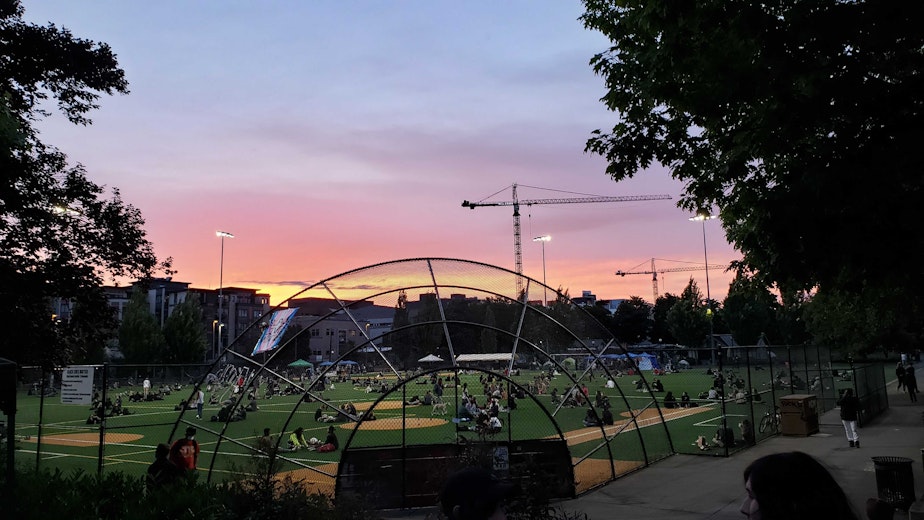A park. A protest. Cal Anderson remains in flux

Seattle city crews cleared out a camp in Capitol Hill’s Cal Anderson Park this week. It was the second time in a month it was cleared, even as the city has signs posted, saying the park is closed.
Heidi Groover reports for The Seattle Times. She's been covering the goings on at the park and spoke with KUOW's Kim Malcolm.
This interview has been edited for clarity.
Kim Malcolm: For someone who hasn't visited the park in a while, what do you see when you go to Cal Anderson now? Can you describe it for us?
Heidi Groover: Much of the park looks like you would remember from before the most recent protests. People will be playing soccer or exercising on the play fields; people walking their dogs in another section; and then in a middle section of the park, near the playfields and the bathrooms, there is a garden that remains from the CHOP, the occupation near the East Precinct from earlier this summer.
Near that garden there are several tents, there have been tables with supplies, and canopies where people offer food, medical supplies, or protest gear like goggles, helmets. Much of the park looks like a standard park, and then a part of it looks like an encampment with a focus on protest.
And all this even though they're still signs up saying that the park is closed, right?
Yes, that's right. The city says that the park has been closed since June 30 to do repairs that are needed after protests earlier in the summer. And they do post large signs saying that the park is closed, but frequently it is being used just as it was before the closure.
Seattle police said that during the clear-out of the encampment at Cal Anderson earlier this week they found some items, like shields and a machete among other things. Who is camping in the park and what do they tell you about why they are there?
Well, this is sort of a continuation from protests earlier this summer. The protesters I've talked to in park are focused on either defunding the Seattle Police Department or abolishing police altogether. Some other protesters have gathered supplies and food donations for people who are living homeless in the park. So, some of the campers are protesters and they are also homeless people who sleep in the park, as well.
You've reported that the city has hired some private security for Cal Anderson, but it's not clear that that arrangement is continuing. Can you tell us about that?
Twice in August the city went into Cal Anderson with crews from the city parks department and officers from the Seattle Police Department; went in and cleared out tents. There was a building in the park that protesters had gotten into and occupied. After that happened this most recent time, the city hired a private company, Jaguar Security, to have security guards in the park to tell people that the park is closed and they need to leave.
Sponsored
However, on Tuesday night when three of those guards arrived at Cal Anderson, this is based on video that was taken that night, they went up to a group of people, protesters in the park. The protesters shouted at them to leave. The security guards walked to another section of the park, and then eventually out of the park.
A man who identified himself as the owner of the security company, when I reached him by phone, said that they felt threatened, they didn't feel safe, and they didn’t intend to go back to Cal Anderson Park. Last night I went to the park and I didn't see any private security inside the park.
What does it tell you that the city hired a private security firm to provide a presence in the park?
The city hasn't opined a whole lot on why they did that, particularly. I think that it's pretty generally accepted that the protesters who are in the park do not want the police there, and the arrival of police can escalate a situation with these protesters. So, perhaps the idea was that security guards might be able to tell people to leave the park, and it wouldn’t appear like the arrival of the Seattle Police Department.
I'm not sure how the city will respond at this point, whether they might hire another company, or perhaps more police officers would respond to the park. None of that is clear yet.
Sponsored
Listen to the interview by clicking the play button above.


